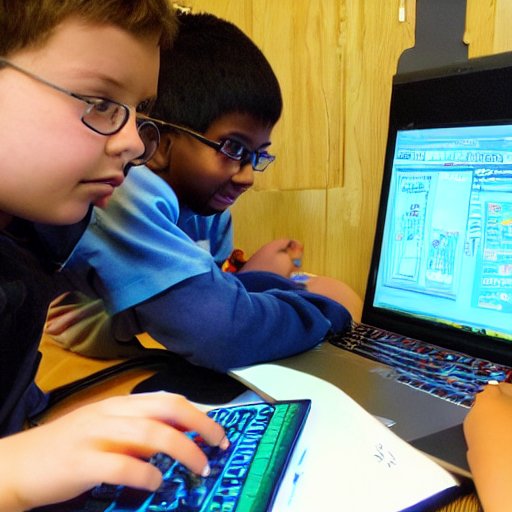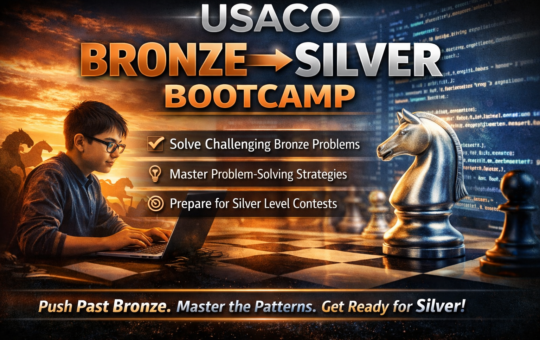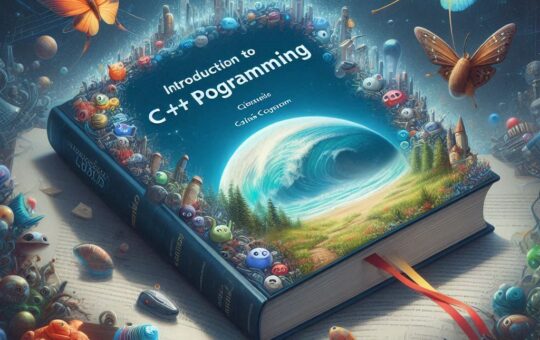
Algorithm Foundations with Python – Core Logic (USACO/USAAIO Prep)
- 13 Sections
- 108 Lessons
- 40 Quizzes
Introduction to Python
- Course Logistics
- To Parents
- Introduction to Computer Architecture, Programming and Python
- Why learn Python
- Homework - create folder, file in OS GUI, command line terminal, VSCode
- Python interactive shell
- How to Use Google Colab
- Advanced topic: Python Virtual environment and Version control system
- Practice: ascii-art using Virtual Env with vscode
Variables and Input Output
- Python Variables and Data Types
- Homework: what is the final value
- Advanced topic: Python Global Variables
- Python Input and Output
- Simple jump-start on Input for coding questions
- Decimal vs Binary (How Computers Count)
- Advanced: Why 1 and '1' Are NOT the Same
- Advanced topic: Python Advanced Input
- Advanced topic: print with, or print with + for string
- Advanced topic: Python Advanced Output
- Python Basic Math Operators
- Homework: python input, output and math operation
Conditional States and Loops
- Loops (while and for) for Game Mechanics
- Advanced : for loop
- Advanced : while syntax
- Advanced Topic: Python Indentation and Coding Style Tutorial
- Homework For and while loop
- If Statements and Decision-Making in Games
- Homework Simple game using if /else
- Homework review: if/else
- Combining Conditionals and Loops for Game Logic
- Design a game scenario (number guessing game)
- Review/Reference for a simple number guessing game
- Python random Module
- Hands-on lab 2: Rock, Paper, Scissors Game
- Rock, Paper, Scissors Game solution
- 🐍 Python Syntax Essentials (Unique to Python)
- 🐍 Programming Obstacles, Computer vs Human, and Print Debugging
- 🔢 Python Modulo Operator %
- 🐍 Python Debugging for Beginners
- 🔄 Overview of Loops and If-Else Statements in Python
- How to Think with Loops & If-Else
- 🔄 Thinking About Double Loops in Python
- 🔄 Thinking About while Loops and break in Python
- Multiple Choice Questions
- Operator Precedence & Operator Selection Multiple Choice Questions
- Flow Control (if / loops) Multiple Choice Questions
- Multiple Choice Questions Input/Output Operations (Console and File I/O)
- Multiple Choice Questions Code Documentation and Structure
- Untitled
Functions, Lambda, Recursive Function
- Introduction to Functions and Their Importance
- Python Function Return
- Creating Custom Functions for Game Actions
- Home work: Farm problems ( total number of legs of all the animals. )
- Advanced topic: Python function Default Arguments, Variable-Length Arguments, and Mixed Calls
- Advanced topic: Lambda Functions
- Recursive function call
- Home work: factorial function in iterative way
- Home work: Write a Fibonacci number function
- Review Fibonacci number function
- Homework: Write Temperature Converter ( from Celsius and Fahrenheit ), Miles to Kilometer converter Module etc
- Advanced Topic: async function
- Review python basic
- Untitled
Python Lists , Tuple, Set, Dictionary and Data Manipulation
- Python string
- Advanced: Checking Whether One String Is Part of Another String and its cheatsheat
- Homework: Palindrome
- Homework: Password Generator
- Review string homework
- Lists for Game Data Storage
- Basic List Operations and Manipulation
- Using Lists to Manage Game Assets
- Python tuple
- Home work Python program to find smallest number in a list
- Home work: Python program to print even numbers in a list
- Homework review: even number in the list and set
- Homework: Python program to find the Strongest Neighbour
- Homework: List Overlap
- Advanced topic: Python map() Function
- Advanced topic: Python join() Function
- Advanced topic: Python Unpacking
- 🌟 Advanced : Understanding map, Iterators, Iterables, and for Loops
- Python sets
- Python Dictionary
- Difference between list, tuple, set, dictionary
- Python Comprehensions: Simplifying Iterative Constructs
- Advanced topic: 🐍 Python ast Module — Simple Tutorial
- Homework: Python program to find the sum of all items in a dictionary
- Home work: Sort Dictionary By Key in Python
- Homework: shopping list
- Review homework
- 🎮 Python Bracket Adventure Quiz
- Quiz: Multiple Choice Questions
Python Classes, OOP ( Object Oriented Programming )
- Introduction to Python Classes
- why self is used in python OOP
- homework : basic oop
- Working with Attributes and Methods
- Python Class Inheritance and Static Variables vs. Instance Variables
- tic_tac_toe
- Sample code for tic_tac_toe
- Python Private Attributes and Methods
- Method Overloading vs. Method Overriding in Python
- Python polymorphism
- Advanced topic: Duck Typing vs. Polymorphism difference
- Python Static Method and Class Method
- simple game using OOP
- Simple OOP Game Example Implementation:
Python Modular Programming
Game Development Fundamentals: Introduction to Arcade - Python game frame work
- Introduction to Python Game Development and popular frameworks
- Python game frame works overview
- Comparison of Popular Python Game Frameworks with code
- Python Turtle
- Introduction to the Python Arcade Library
- Homework draw shapes with different color, radius, and background
- Homework Review
- Adding Movement and Animation
- Animation Circle, rectangle, ellipse , and bound around the boundary like the sample we learned in class
- Add game interaction: Mouse, Keyboard and Joystick
- Keep the ball/rectangle/elipse within the boundary of window using mouse and keyword
- Adding Sound and Music
- Homework: Animating a ball using mouse/keyboard to move up/down/left/right, and hit the wall, bounce back with background musci and hitwall sound
- Review Home work: wall/ball/music/mouse/kb
Advanced Game Development Techniques
- Game Collision Detection
- HOMEWORK: add keyboard move to the sample code , and we can move player using keyboard to collect coins
- Advanced techniques: Moving Sprites and Coins
- Home work: add two players to the sample sprites
- Review Homework : two players
- Advanced Techniques: Using Sprites to Shoot
- Homework: add space_key to shoot and using different laser color and sounds
- Advanced techniques: Sprites and Walls
- Using a Camera for Scrolling
- Homework: add player position on the GUI camera
- Platformers
- Platformer add moving obj and view
- Pymunk Physics Engine
- Distribute Arcade Game 1 : Bundling a Game with pyinstaller
- Distribute Arcade Game 2 : Bundling a Game with nuitka
- Homework: add ladder to sample platformer code
Building Simple Games (Duration: 4 weeks)
Final Project
Game Testing and Debugging (Duration: 1 week)
Wrap-up and Next Steps (Duration: 1 week)
In the age of GenAI—where AI tools shape industries and automation is becoming the norm—one skill rises above the rest: Python programming.
Python isn’t just a coding language. It’s the foundation behind AI, data science, automation, game development, and competitive programming.
With this course, students will not only learn to use AI—they’ll learn to think like programmers who can go beyond AI’s limitations.
Designed for Grades 4–12, the Pre-USACO Python Creativity & Problem-Solving Lab builds strong programming fundamentals through hands-on game projects, then gradually develops analytical thinking that prepares students for competitive coding in the future.
🌟 What Students Will Learn
1. Core Programming Foundations
Students are introduced to essential Python concepts—variables, loops, conditionals, functions, and data structures. These fundamentals build the computational thinking skills needed for both creative projects and later USACO-style problem-solving.
2. Creativity Through Game Development
By designing characters, levels, logic, and interactions, students express their creativity while learning how real games are built. This blend of imagination and technical skill makes learning both fun and meaningful.
3. Hands-On, Project-Based Learning
Every concept is immediately applied through guided mini-games and custom projects. Students experience the excitement of creating something playable—boosting confidence, curiosity, and persistence.
4. Early Exposure to Competitive Thinking (Pre-USACO)
Game mechanics naturally introduce logical thinking, debugging, and algorithmic ideas. These are the same skills needed in competitive programming, giving students a strong head start without pressure.
5. Multidisciplinary Skills
Game development combines art, logic, design, sound, storytelling, and user experience. Students learn to bring multiple skill sets together to solve challenges.
6. Collaboration and Communication
When working on shared projects, students practice teamwork, communication, and idea-sharing—essential skills in real-world STEM careers.
7. Focus, Grit, and Problem-Solving
Building a game from scratch teaches perseverance. Students learn to analyze problems, debug issues, and improve their work through iteration—developing strong problem-solving habits.
8. Digital Literacy for the Future
This course gives students a solid foundation in programming and computer thinking—skills that will support them in AI, robotics, data science, web development, and more.
9. Presentation Skills
When students demo their games, they practice explaining logic, design decisions, and problem-solving steps—strengthening communication and confidence.
10. Fun, Engaging, and Motivating
Kids love games—so learning through games keeps them excited, focused, and eager to explore. Fun becomes the vehicle for real learning.
🎓 Course Outcome
By completing the Pre-USACO Python Creativity & Problem-Solving Lab, students (Grades 4–12) will develop:
-
Strong Python foundations
-
Creativity and design thinking
-
Logical reasoning and pre-competitive coding skills
-
Confidence in building real, playable games
-
Readiness for future USACO training, advanced Python, or AI/robotics paths
This course builds a strong base for both creative coding and future competitive programming success, preparing students for a technology-driven future with confidence and curiosity.
Want to submit a review? Login
Reviews
-
Oct 21, 2025 @ 12:31 am
I love this course!
I learned a lot from this course and love doing coding problems. They are super fun and very engaging. I'm so happy to learn Python here.
-
Jan 1, 2025 @ 3:57 pm
absolutely amazing!!
wonderful course! good paced lessons, enjoyed the videos and curriculum. definitely recommend.
-
Oct 7, 2023 @ 2:14 pm
easy to learn


